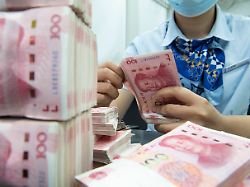Trade is made easier
Riyadh and Beijing agree on billion-dollar currency swap
November 20, 2023, 3:08 p.m
Listen to article
This audio version was artificially generated. More info | Send feedback
China and Saudi Arabia have been expanding their economic cooperation for years. Now both countries have decided to exchange currencies. This should also help to make China’s currency, the renminbi, more independent of the US dollar.
China has struck a currency swap deal with Saudi Arabia in a bid to increase the importance of its currency, the renminbi. The central banks of both countries have concluded a so-called currency swap worth 50 billion renminbi (around 6.38 billion euros) or 26 billion Saudi riyals, said the Chinese People’s Bank in Beijing. The agreement will strengthen financial cooperation between the two countries and facilitate trade and investment for both sides.
In a currency swap, as in this case, two countries exchange their currencies for a certain period of time. This is basically intended to create currency liquidity, which can be useful for commodity transactions or financial transactions. A possible advantage is that the contractual partners can protect themselves from risks caused by fluctuations on the financial market with the stable price that such a deal can bring.
Analysts have been observing for some time that China wants to internationalize the renminbi and thus become more independent of the US dollar. Dollar reserves could be frozen in the event of a conflict, which would make it more difficult to pay for oil imports. The currency swap with Saudi Arabia could also be about securing the flow of energy in the long term.
“New Silk Road” as a huge investment project
China and Saudi Arabia have been working together economically for years. The People’s Republic, ruled by the Communist Party, is a major importer of Saudi Arabian oil. The country on the Arabian Peninsula is part of China’s “New Silk Road” infrastructure and investment project. According to information from Beijing, the world’s second largest economy has a stake in two refineries and an ethylene plant there.
Just last week, a new airport financed by China was opened in Cambodia near the famous Angkor Wat temple complex as part of this “New Silk Road”. In total, the hub cost the equivalent of around one billion euros, and by 2040 it is expected to have a capacity of twelve million passengers per year.
Initially, the airport will be operated jointly by both countries and will be handed over to Cambodia after 50 years, i.e. in 2073. Another airport is currently being built not far from the capital. It is expected to cost $1.5 billion and be completed in 2025.
